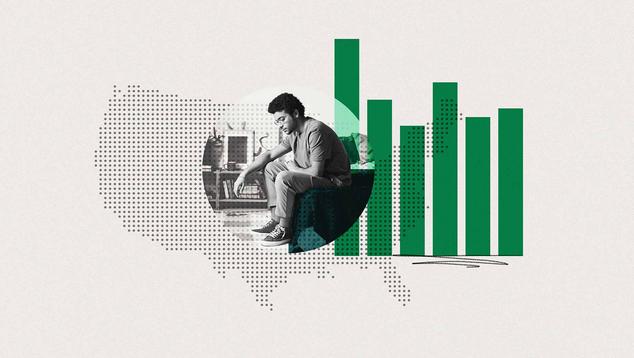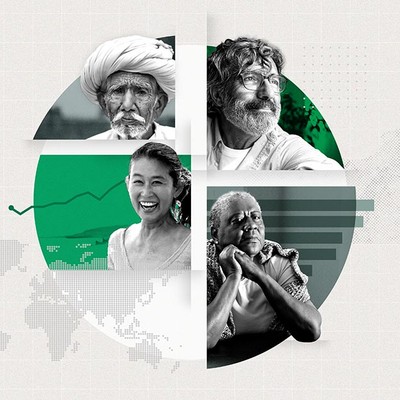LONDON — Younger men in the U.S. are more likely than other Americans — and their peers in other wealthy nations — to report feeling lonely.
Based on aggregated data from 2023 and 2024, 25% of U.S. men aged 15 to 34 said they felt lonely a lot of the previous day, significantly higher than the national average of 18% and the total for young women (also 18%).
Younger U.S. men are also more likely to feel lonely than their counterparts across the 38 mostly higher-income, democratic countries in the OECD (Organisation for Economic Co-Operation and Development).
Across the OECD, a median of 15% of younger men report feeling lonely, similar to the overall OECD median (16%), suggesting that younger men in many wealthy nations are not as affected by loneliness as those in the U.S. No other OECD country has a larger gap in loneliness between young men and the rest of the adult population.
In general, loneliness levels across different U.S. age and gender groups are comparable to those in other OECD countries. One further exception is U.S. women aged 35 to 54: 20% reported feeling lonely, which is higher than the OECD median for that group (14%).
Younger Men Are Lonely in Many Rich Countries, but the U.S. Stands Out
Younger American men are not entirely alone in their experiences of loneliness. In nine other OECD countries, at least one in five younger men say they feel lonely — including in Türkiye (29%), France (24%), Ireland (23%), and Canada (22%).
However, in most OECD countries, younger men’s loneliness levels are similar to the national average. The U.S. stands out for younger men having significantly higher levels of loneliness than other residents.
In only three countries — the U.S., Iceland and Denmark — is the loneliness rate among young men higher than that for other adults. In Iceland and Denmark, 15% of younger men report daily loneliness, compared with 10% and 9%, respectively, of the rest of the population. Nowhere is the gap as large as in the U.S., where young men are uniquely lonely (25%) compared with all other adults (17%).
By contrast, younger men are less likely to report being lonely than the rest of their country’s population in nine countries — such as Slovakia (4% vs. 15%, respectively), Greece (15% vs. 25%) and Colombia (14% vs. 23%) — while they are similar to the national average in the remaining 26.
Young American Men Also Report More Daily Worry
Loneliness is one of three experiences, along with stress and worry, that young U.S. men are more likely than the rest of the country to report. Meanwhile, they report similar levels of the other emotions measured on the Gallup World Poll, including sadness, anger, enjoyment, laughter, feeling well-rested and feeling respected. This suggests young American men are not broad outliers but have experiences in line with the rest of the population, though U.S. women overall consistently report higher levels of sadness and stress than men.
Over half (57%) of younger men in the U.S. say they feel stressed daily, compared with 48% of other adults. But this is not unusual in the OECD, where younger men also report more stress (42% vs. 36%) than other adults.
Daily worry, like loneliness, is another area where young men in the U.S. stand apart from their OECD counterparts: 46% of young American men say they experience daily worry, compared with 37% of other adults in the U.S. This gap is unusually wide — across the OECD, 36% of both young men and other adults report that they felt worried the previous day — with only Germany and Sweden showing a comparable difference between young men and the rest of the population.
Why Loneliness Matters
Feeling lonely every day is strongly associated with a range of negative life outcomes. While it does not appear to affect Americans’ confidence in national leadership, trust in the honesty of elections and views on their economic situation — including living standards, the local job market and housing affordability — it is closely tied to key aspects of personal wellbeing and how people evaluate their lives.
Americans who experience daily loneliness are significantly less likely to report smiling or laughing a lot, feeling well-rested, or being satisfied with their personal freedoms and social connections than those who are not lonely. They are also half as likely to be classified as “thriving” in life.
The Life Evaluation Index shows that lonely Americans rate both their current and future lives lower than those who are not lonely do — though a smaller gap in future life ratings suggests a lingering sense of hope, a universal need of people globally.
Bottom Line
Loneliness is not evenly felt in the U.S., as young men report having this experience more than their fellow residents at home and their peers abroad. They stand out, not only in terms of absolute rates of loneliness but also in how much more likely they are to feel lonely compared with younger women and others in their own country. This is a rare pattern across wealthy countries, none of which exhibit a starker divide between young men and the rest of the nation’s residents.
While young men in the U.S. report experiences similar to other Americans across many emotional measures, they are more likely to feel worried and stressed, as well as lonely. When persistent or severe, these negative emotions can be associated with broader mental health challenges — an area where young American men also face notable difficulties. For example, they are significantly more likely than their female peers to experience deaths of despair.
Gallup has measured global experiences of loneliness only since 2023, so it is unclear how its prevalence has changed over time. Regardless, the data show that loneliness is weighing heavily on a generation of young American men.
To stay up to date with the latest Gallup News insights and updates, follow us on X @Gallup.
For complete methodology and specific survey dates, please review Gallup's Country Data Set details.
Learn more about how the Gallup World Poll works.





